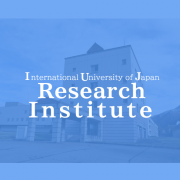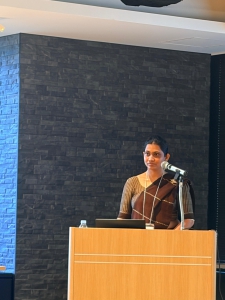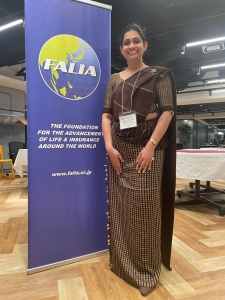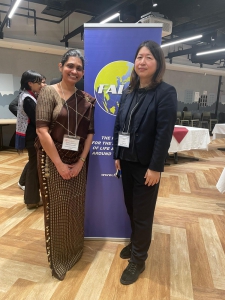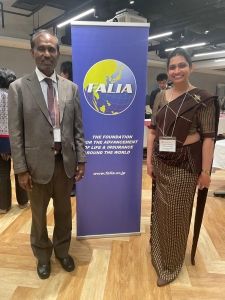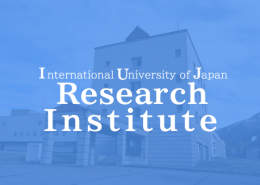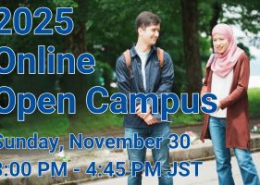News & Announcements
トリプルヘリックス・フォーラム ― サステナビリティとAIによるデジタル変革 ― 開催のお知らせ Triple-Helix Forum on Sustainability and AI-Driven Digital Transformation
国際大学研究所(IUJ Research Institute)は、「サステナビリティとAIによるデジタル変革」をテーマとしたトリプルヘリックス・フォーラムを、2026年3月13日(金)にIUJ六本木キャンパスにて開催いたします。
本フォーラムでは、産・官・学の立場から、AIを活用した持続可能な社会・組織の実現に向けた課題と実践、今後の連携の可能性について議論します。
The IUJ Research Institute is pleased to announce the Triple-Helix Forum on Sustainability and AI-Driven Digital Transformation, to be held on Friday, March 13, 2026, at IUJ Roppongi.
This forum brings together perspectives from academia, industry, and government to explore how AI-driven digital transformation can support sustainability, responsible innovation, and cross-sector collaboration.
【開催概要 / Forum Details】
日時:2026年3月13日(金)16:00–18:00(終了後、無料の交流レセプションあり)
会場:国際大学 六本木キャンパス(東京オフィス)
形式:対面開催
使用言語:英語
******
Date & Time: Friday, March 13, 2026, 16:00–18:00 (Followed by a complimentary social reception)
Venue: IUJ Roppongi (Tokyo Office)
Format: In-person only
Language: English
【プログラムテーマ / Program Theme】
トリプルヘリックス連携による サステナビリティとAI主導のデジタル変革の推進
Advancing Sustainability and AI-Driven Digital Transformation through Triple-Helix Collaboration
【登壇者 / Speakers】
▶ Akira Horiuchi
Director, NVIDIA Enterprise Marketing
Title: AI at Scale: Accelerating Sustainable Innovation
▶ Kazu Akitomo
Chairman, Saitama Industrial Promotion Public Corporation
Title: Circular Economy and AI Challenges: A Saitama Case
▶ Matteo Cristofaro(オンライン登壇)
IFSAM Vice President, Education
Title: Human-Centric Decision Making in the Age of AI: Implications for Sustainable Organizations
【セッション構成 / Session Format】
各登壇者による講演の後、モデレーターによるディスカッションを行います。
さらに、小グループ形式での意見交換を通じて、参加者が登壇者と直接対話できる機会を設けます。
Following the presentations, a moderated discussion will take place.
The session will be complemented by small-group discussions, allowing participants to engage directly with the speakers.
【参加・登録 / Registration】
本フォーラムは、大学、企業、公的機関等に所属する研究者・実務家をはじめ、幅広い皆様にご参加いただけます。
参加をご希望の方は、以下の登録フォームよりお申し込みください。※定員に達し次第、受付を終了いたします。
Participation is open to researchers and practitioners from universities, industry, public institutions, and beyond.
Please register via the form below. Registration will be accepted on a first-come, first-served basis.
【問い合わせ / Contact】
Office of Research Institute
国際大学研究所
ori@iuj.ac.jp
IUJ Student Receives First Prize at FALIA Essay Competition 2025 Award Ceremony
Ms. Lahiru Nirasha Tharamasinghe, a second-year student in the Graduate School of International Management (GSIM), won First Prize at the prestigious FALIA Essay Competition 2025, and the awards ceremony was held in Tokyo on January 30, 2026.
Below is a comment from Ms. Lahiru Nirasha Tharamasinghe:
“I am truly grateful and honored to have received the First Prize at the FALIA Award Ceremony held in Tokyo on January 30, 2026.
Representing IUJ at this prestigious event was a truly humbling experience, and I had the privilege of presenting my essay titled ‘Bridging the Protection Gap: Enhancing Life Insurance Accessibility and Inclusion for Individuals with Congenital Disabilities in Sri Lanka.’
Moreover, I would like to express my heartfelt gratitude to IUJ for the continuous support and enriching academic environment that inspired this work. My sincere thanks go to Professor Ying Ying Zhang Zhang, Professor Cooray, and my supervisor, Professor Comai, for their invaluable guidance, encouragement, and mentorship throughout this journey.
Winning this award is not only a personal milestone but also a meaningful reminder of the power of research to create social impact. I remain committed to continuing this journey of bridging gaps and building a more inclusive financial landscape.”
The award-winning essay, “Bridging the Protection Gap: Enhancing Life Insurance Accessibility and Inclusion for Individuals with Congenital Disabilities in Sri Lanka,” was highly commended for its insightful analysis of critical challenges facing the life insurance sector, as well as for its innovative and practical policy recommendations. The research presents concrete solutions aimed at improving accessibility and inclusion in life insurance for individuals with congenital disabilities.

